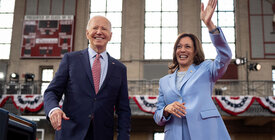Thanks to weak campaign finance laws, the wealthiest Americans and corporations possess immense power to shape our elections. Recently, more and more political spending has been fueled by tech wealth as questions of how to regulate Silicon Valley have risen on policymakers’ agendas. Such massive spending could help drive corporate profits at the expense of the public interest. Additionally, some prominent tech figures have advanced radical, sometimes antidemocratic, views through their big spending. By passing the Freedom to Vote Act, Congress can strengthen the rules to help ensure that normal Americans, not just the highest bidders, are fairly represented in our policymaking process.
Recent events have highlighted the outsize influence of tech money in politics.
In just a few years, the cryptocurrency industry has gone from a non-spender to the biggest corporate spender in our elections, accounting for almost half of all known corporate contributions this year. The crypto firm Coinbase has donated over $90 million so far this cycle, earning it the title of second biggest donor in the country. The industry’s spending has boosted candidates from both parties, incentivizing candidates to compete for its support through policy commitments. The effects are not hard to find. They include a GOP platform that takes a strong anti-regulatory stance on crypto and a “Crypto for Harris” event featuring Senate Majority Leader Chuck Schumer.
Former President Trump’s closest tie to Silicon Valley is on the ballot with him. His running mate, Ohio Sen. JD Vance, is a former venture capitalist whose political reinvention and rise to power was enabled by millions in spending by his mentor, billionaire PayPal cofounder Peter Thiel. A subset of Silicon Valley elites who have drifted toward the Trump camp, thanks in part to deregulatory policy preferences, cheered his selection.
Much of the recent news coverage of tech industry spending has focused on Elon Musk, currently the richest person in the world, who endorsed Trump and has aligned himself with a pro-Trump super PAC. But Musk is just one of many tech-world donors fueling the right. He joins the ranks of Palantir cofounder Joe Lonsdale, venture capitalists Marc Andreessen and Ben Horowitz, and the Winklevoss twins — two cryptocurrency entrepreneurs who attempted to donate more than the legal maximum to various pro-Trump and GOP entities.
Vice President Harris has backers in the industry too, including billionaire LinkedIn cofounder Reid Hoffman, who gave $10 million to a pro-Biden super PAC that now boosts Harris. Hoffman endorsed Harris the day Biden dropped out. Days later, he publicly called for her to replace the chair of the Federal Trade Commission, attracting scrutiny from observers concerned that his money could buy him influence in a Harris administration.
One reason that big donors like these make observers uneasy is that they can exploit the antidemocratic features of our campaign finance system to further harm our democracy. Thiel’s tech-inflected, “bosses-on-top” brew of antidemocratic politics led him to spend millions of dollars in 2022 boosting unconventional Republican candidates like Vance who agreed with him. Vance has listened to a range of thinkers that include one supporter of an American dictatorship (Thiel’s friend Curtis Yarvin) and an array of “postliberals” who prize top-down, theocratic governance over democracy and individual rights. Musk advances a volatile, conspiracy-laden politics of cultural grievances and outlandish claims.
Still, the main incentives for much of the tech industry’s electoral spending are likely economic. Tech wealth is enormously affected by regulatory decisions and fueled by government contracting. Just look at the recent antitrust ruling against Google and the congressional hearings on the damage to teens from social media like Instagram and Facebook. Currying favor with powerful politicians could make it easier to put a billionaire’s preferred policies in place. As with other industries, corporate tax rates are also likely on their minds.
These problems have festered thanks to the deregulation of campaign finance brought about by the Supreme Court’s 2010 ruling in Citizens United, which allowed unlimited contributions to super PACs that are often controlled by a single major donor. This provided the means for billionaires to funnel vast sums into our elections. And although super PACs are supposed to operate independent of candidates, weak rules mean they can actually work closely with campaigns — including on canvassing and other ground-game activities, thanks to a recent ill-advised Federal Election Commission opinion. On top of that, untraceable “dark money” allows for secret giving to politicians. (This is the loophole that the former crypto billionaire and convicted fraudster Sam Bankman-Fried took advantage of when he gave publicly to Democrats and secretly to Republicans.) These are among the many reasons why Congress should pass the Freedom to Vote Act, which would strengthen rules against coordination and eliminate dark money, and has bipartisan public support.
The free flow of big money in politics means the interests of the ultra-wealthy — often different from those of most Americans — get overrepresented. And it helps sustain niche ideologies that may lack popular backing thanks to spending by, to borrow a term from the political scientist Daniel Schlozman, “renegade factions of the tasseled-loafer class.” This top-down system of campaign finance bears a resemblance to the political visions of those like Yarvin who are skeptical of democracy and would prefer a hierarchical society ruled by bosses.
It doesn’t have to be this way. Commonsense campaign finance reforms, starting with the Freedom to Vote Act, can change it.




